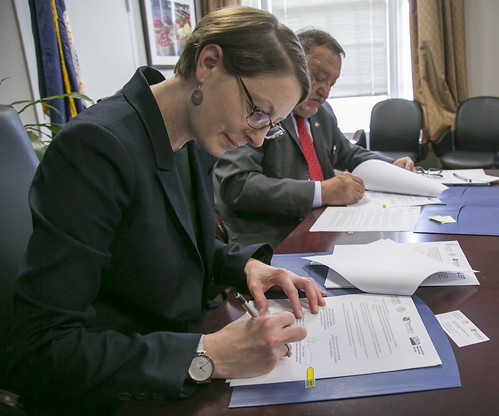
As consumer demand for organic products continues to grow around the world, the USDA Organic Seal has become a leading global standard. USDA provides support for the vibrant organic sector, representing a retail market of over $43 billion in the United States alone. USDA’s Agricultural Marketing Service (AMS) is excited to announce another way we are helping organic producers reach new markets and offering consumers additional organic products.
We plan to establish a Joint Organic Compliance Committee in support of a potential organic equivalency arrangement between the United States and Mexico. There is already a robust trade in agricultural products taking place between our two countries: Last year, the United States exported over $100 million of organic food products to Mexico – our third largest agricultural export market – and Mexico supplied the United States with food certified to the U.S. organic standards, including seasonal produce.
But this relationship would be further facilitated by an equivalency arrangement. Equivalency arrangements provide U.S. organic producers and handlers with access to a growing global organic market. By allowing organic products certified in one country to be sold as organic in each participating market, they reduce the cost of duplicative certifications, fees and inspections. In the past six years, USDA has established equivalency arrangements with Canada, the European Union, Japan, Korea and Switzerland, providing U.S. organic farmers and businesses with streamlined access to international organic markets valued at over $35 billion.
Given the important benefits an arrangement could bring to both countries, it is essential that the process toward equivalency be thorough, and that any arrangement is strong and mutually beneficial. This includes ensuring that the organic systems of both countries are equivalent in all areas, including monitoring and enforcement.
As part of the equivalency process, which includes assessments and technical discussions, the United States conducted an audit of Mexico’s organic system and participated in a technical meeting with Mexican officials in April. Through this process, the United States determined that Mexico has developed a robust organic system. Both countries agree that collaboration on issues related to organic monitoring and enforcement would further reinforce the equivalency process and build strong support among the organic community.
To coordinate work on monitoring and enforcement, the United States and Mexico will establish the committee by exchanging terms of reference between AMS and Mexico’s National Service for Animal and Plant Health, Food Safety and Quality. The committee will work to increase transparency, promote bilateral technical exchange, strengthen monitoring and enforcement controls, and build stakeholder confidence in Mexico’s organic program.
Specifically, the committee will establish import certificates within six months to provide additional certification verification for traded products. In addition, the Committee will implement sampling of organic products for chemical residues and will share sampling results with the two countries’ regulatory authorities. The committee will also engage with certifiers operating in Mexico by conducting listening sessions to determine any additional training, oversight, or policy guidance needs.
The United States deeply values our relationship with Mexico as we work towards organic equivalency. Both countries agree that strong compliance and enforcement programs are essential to maintaining organic integrity across borders. We look forward to continuing our work to establish an organic equivalency agreement with Mexico as the Committee’s work unfolds.



